Overview[1][2]
Shikimic acid is a synthetic raw material for the anti-bird flu drug oseltamivir phosphate (trade name: Tamiflu) and the anti-tumor drug dioxamycin, glyoxalase inhibitors, etc. Shikimic acid is a cyclic organic acid found in natural plants such as star anise and some gymnosperms. It is the main active ingredient in the traditional Chinese medicine star anise, a plant in the Magnoliaceae family. After years of research, it has been shown that it has thrombolytic, analgesic and anti-tumor effects. As an intermediate in chemical synthesis, shikimic acid is not only commonly used in analgesic, anti-cancer and anti-thrombotic drugs, but also in the synthesis of pesticides and antibacterial agents.

Preparation[2]
1500kg dried star anise fruit (shikimic acid content is 3.69%) is crushed to a particle size of 20 to 30 mesh and placed in a percolation tank. According to the material: water = 1:3 mass ratio, water is passed into the material. Press down and heat the water temperature to 75°C to soak the material for 1 hour, turn on the motor and cycle for 15 minutes, then soak for 1 hour. Repeat this 5 times. After soaking and extracting for 7 hours, after concentrating the percolate in the internal circulation concentration tank, the specific gravity is 1.15, shikimic acid crude extract weighing 45.7kg.
2 While hot, mix the shikimic acid crude extract according to the ratio of materials: silica gel = 1:1, stir evenly, cool to dry, and use it to load and inject through the chromatography column.
3 Place the cooled, dried and stirred silica gel samples on the top of six chromatography columns with an inner diameter of 40cm. The sample thickness is about 15cm, and then use a single component eluent – ethyl acetate. The shikimic acid sample at the upper end of the chromatography column is eluted at a flow rate of approximately 800ml/min.
4 Use a high-performance liquid phase detector to detect the outflowing eluent. When it is determined that the eluent contains shikimic acid, the collection will begin. The collection will be completed after 5 hours. Special note: During this process, ethyl acetate was achieved. Grease pipeline, cycle operation. The conditions for shikimic acid detection are mobile phase: double distilled water with PH value adjusted to 2 with phosphoric acid; flow rate: 0.6ml/min; wavelength: 213nm; column temperature 25°C; column C18; injection volume 20 microliters; control concentration 20 micrograms/ml.
5 Concentrate the collected liquid to dryness, add 15L methanol to dissolve, then add 45L water, let it stand and refrigerate for crystallization, filter the crystals the next day to obtain 18kg of pure dry shikimic acid, and the detected content is 92%.
6 Use the same crystallization method in step 5 to recrystallize once to obtain 16kg of fine shikimic acid with a content of 98%. The final extraction rate of shikimic acid is 85%.
Applied Research[3-4]
Ma Jinliang and others grafted shikimic acid onto polylactic acid (PLA) nonwoven fabrics, aiming to develop new multifunctional health care materials that can be used in the medical and health fields. In the shikimic acid grafting treatment, cross-linking agents PC-100 and IPDI were used for bridging tests. By adjusting parameters such as reaction temperature and concentration, and optimizing reaction conditions, the air permeability, moisture conductivity, stiffness and antibacterial properties of PLA nonwoven fabrics were tested. The optimal grafting process obtained from the experiment is: PC-100 dosage 0.2 g, shikimic acid mass concentration 9 g/L, immersion temperature 60°C, baking at 120°C for 3 minutes, and then rinsed with ethanol and distilled water. The treated PLA nonwoven fabric has good antibacterial properties, and the antibacterial rates against Escherichia coli and Staphylococcus aureus reached 77.3% and 72.7% respectively.
Wu Kegang and others studied the inhibitory effect of shikimic acid on lipase. Combining enzyme kinetics method and fluorescence spectrometry, the inhibition kinetics and inhibition mechanism of lipase by shikimic acid were studied. The research results show that when the lipase concentration is 1.00 mg/mL, the reaction time is 15 min, the half inhibitory concentration (IC50) of shikimic acid on lipase is 3.16 mg/mL, and the optimal temperature increases from 37°C to 41°C. , the inhibition type is a mixed lipase inhibitor, the inhibition constants are Ki=4.30mg/mL, Ki’=3.28mg/mL. In the range of emission wavelength 300~450nm and excitation wavelength 240~300nm, the fluorescence spectrum obtained by scanning can be seen that shikimic acid has a fluorescence quenching effect on lipase, which can make the endogenous chromophore of the enzyme ( Tyr, Trp, Phe) are exposed from the hydrophobic region inside the protein to the hydrophilic environment, thereby changing the structure of the enzyme and inhibiting its catalytic effect. Studying the inhibitory properties of shikimic acid on lipase provides ideas and basis for the development of weight loss drugs and health foods, and has potential application value.
Main reference materials
[1] [Invented in China, invented in ChinaAuthorized] CN201510560354.6 HPLC determination method of shikimic acid and 3-dehydroshikimic acid in pomegranate peel
[2] [China invention, China invention authorization] CN200710021150.0 A production process of shikimic acid
[3] Ma Jinliang, Ma Wenxiao, Wen Kaiqi. Research on grafting of shikimic acid on polylactic acid nonwoven fabrics [J/OL]. Synthetic Fibers, 2019(08):39-42[2019-08-27 ].https://doi.org/10.16090/j.cnki.hcxw.20190813.006.
[4] Wu Kegang, Tan Weitong, Chai Xianghua, Duan Xuejuan. Research on the inhibitory effect of shikimic acid on lipase [J]. Grain and Oils, 2019, 32(05): 20-25.

 微信扫一扫打赏
微信扫一扫打赏

